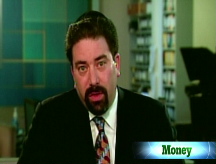Retirement: Win the game of risk
Moshe A. Milevsky is a math whiz who trains his brainpower on retirement planning. His view: Success comes to those who hedge their bets.
 |
| "Stop thinking about how to beat the market and start thinking about an income you can't outlive," says Milevsky. |
(Money Magazine) -- The classic vision of retirement planning goes something like this: You start broke. You invest as best you can, and if nothing goes too terribly wrong, you finish with enough money to support yourself.
Retirement expert Moshe A. Milevsky, an associate professor at York University's business school in Toronto, sees it a bit differently. In his view, you start with all the wealth you need in the form of your lifetime earning power. Your job is to convert that personal asset as efficiently as possible into financial assets you can live off once your earning power runs out.
As for things going terribly wrong: Well, odds are that at some point in your life they will. So the key to retirement success, he says, is to identify and ensure against the risks that could knock you off track.
Milevsky's own life offers a prime lesson in how a chance event can derail the best-laid plans. He was studying graduate-level math and physics at Toronto's York University - envisioning a career "smashing atoms together," as he puts it - when his father died of cancer at age 50. The oldest of five children, Milevsky was forced to become a quick expert on his family's money.
The experience shifted his focus from academic physics to the practical math of personal finance and risk management. That unusual angle has defined his career and inspired the Individual Finance and Insurance Decisions Centre, the think tank that he founded eight years ago.
It's also the subject of the latest of his five books, "Are You a Stock or a Bond?", which lays out his views on retirement planning. In late August he spoke with managing editor Eric Schurenberg.
Question: Most advisers say the way to handle risk in retirement planning is to start out investing aggressively, with a lot of stocks in your portfolio, then gradually shift into safer assets like bonds as you get older. What's wrong with that?
Answer: It's an oversimplification. How long you have until retirement is one thing to consider when deciding how much risk to take. But there are many other variables.
Q. Like what?
A. The key is what economists call your human capital. Early in life, you tend to have very few financial assets - investments you can sell for money - but you do have a lot of time in the labor force in front of you, and that is your most valuable asset.
As your career goes on, you earn a salary and devote some of it to acquiring investments. So the goal of investment management during your working life is to efficiently convert your human capital into financial capital.
Q. What does that mean other than saving adequately and investing wisely?
A. You also need to look at the risk inherent in your human capital: How stable is your job, how dependent is it on financial markets, how related is it to the economy as a whole?
If you have a stable income that doesn't rise or fall with the stock market, you should have more money in stocks than the usual investment model for someone your age says you should.
Otherwise - if, say, you work in the securities industry, where your income is likely to hinge a lot on the stock market - you need to invest more heavily than you might think in safe and secure bonds.
Q. Most advisers would say you also have to consider whether you have the nerve to handle a higher or lower level of risk.
A. I think advisers tend to take the mental aspect a little too far. People's risk tolerance changes every day. Yesterday the market is up: People are risk tolerant. Today the market plummets: They're no longer risk tolerant. You should build your retirement portfolios on something more stable than just your mood this morning.
Q. Have you designed your own portfolio built around your human capital?
A. Absolutely. As a tenured professor, with a very predictable income stream, I view my human capital as a bond. So to diversify, I have all my portfolio in stocks. In fact I've borrowed to invest more in stocks, so I'm actually 150% in equities.
Q. Must have been a tough year for you.
A. Yeah, the last few months have not been pretty. To take the sting out of the losses on my brokerage statement, every month or so I open a spreadsheet and recalculate all my capital, human and financial. As I said, my human capital is essentially a bond, so it has been rising in value as interest rates go down. That makes me feel better.
Q. That exercise would be less comforting, I'd imagine, to people who are close to retirement and have used up most of their human capital.
A. True. In the years right before and right after retirement, your financial security is very sensitive to market fluctuations and other risks that were not such an issue before. You need to change your mind-set from wealth accumulation to risk management.
Q. What are the risks?
A. I've run thousands of simulations of hypothetical retirements and ranked what can go wrong. Far and away the biggest causes of failure are longevity risk, inflation and a sour market early in retirement.
Q. Take us through them.
A. Longevity risk: This the chance that you'll live too long for your savings - is particularly hard to plan around. Your retirement can literally last anywhere from 10 to 40 years. That wasn't a problem when you could count on a traditional "check a month for life" pension. But odds are, your employer doesn't offer one anymore.
Inflation: The risk of rising prices is something you don't need to worry about in early or mid-career, when most of your wealth is in the form of human capital. That's because wages tend to keep up with inflation. But once you retire and your wealth has been transformed into financial capital, you are completely exposed to inflation risk. Over a 25-year retirement - typical for a married couple - inflation at 4% will cut the value of a $1,000 pension check to just $375.
Crashing stocks:The third big risk is a bear market. Over a few decades, you'll always have a few down markets, of course. When you're working, it doesn't matter whether the down markets occur early in your life or later. As long as you buy and hold, you'll end up with the same amount of money.
But once you retire, it matters a lot when the bear markets hit. If one occurs early in your retirement, your money won't last nearly as long as if it occurs a few years later. That's because if you start making withdrawals on top of market losses, it's hard to ever make up the lost ground.
Q. How do you hedge those risks?
A. No one kind of investment works against all three. So you need to diversify among investment products, just as you need to diversify among stocks and bonds and so on. This matters more than most people think.
Q. What investment products are we talking about?
A. One category is pensions or annuities, typically a fixed monthly check that an insurance company or pension fund guarantees to keep sending you as long as you live. That's a great solution to longevity risk.
But it's not much help against inflation, which will erode the value of any fixed payment over time. So you also need the traditional mutual fund portfolio that you manage and from which you withdraw funds over an extended period. You can choose high-returning assets like stock funds, which you'd expect to stay ahead of inflation over time.
On the other hand, those are exactly the assets that leave you vulnerable to a market downturn early in your retirement. That's where the third category comes in: the new generation of variable annuities with living benefits. They essentially promise you some upside linked to the stock market but at the same time guarantee you a minimum income for the rest of your life, regardless of when a bear market lands during your retirement.
Q. Your own research years ago showed variable annuities to be way overpriced for the benefits they provided. What changed your mind?
A. If today's variable annuities looked like the product of the same name 10 years ago, I'd still be opposed to them. They used to promise to make up losses only if you died while the market was down.
But the new ones deliver benefits you can claim while you're still alive. And the protection they provide against market losses would be very expensive if you tried to buy it some other way - say, in the options market.
So I used to be something of a crusader against variable annuities, but now I fall back on what the economist John Maynard Keynes said when someone challenged him for supposedly flip-flopping. "When the facts change," he said, "I change my mind. What do you do, sir?"
Do you (and your spouse) make more than $170,000 annually and worry about tax-efficient retirement planning? If so, send your name, age, occupation, income and questions, along with a recent photo, to makeover@moneymail.com. We will be providing advice to a family in this situation in an upcoming article - and it could be you! ![]()




